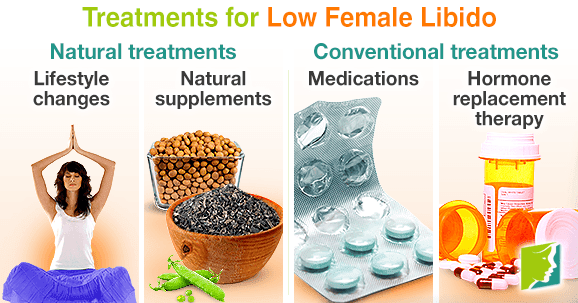Contents
Medical treatments for low libido
Hormonal therapies
Hormonal therapies are used when the decreased libido is caused by a hormonal problem.
In men, a drop in libido caused by low testosterone can be treated with testosterone replacement therapy. A blood sample is used to check the testosterone level.
Testosterone is available as patches affixed once daily to the back, abdomen, arm, or thighs, as a gel (which is applied to the skin once daily), as an injection (given by doctor every 3 or 4 weeks) or in capsules.
Therapies Testosterone come with a few side effects and risks which include acne, decreased sperm production, water retention, and prostate enlargement. They are effective on desire disorders only in 1 in 3 men. On the other hand, this treatment should be handled with care because it is a lifelong treatment. Once in place, it slows down the natural production of testosterone by the testicles, which implies that when treatment is stopped, this secretion would be further reduced, when it was already insufficient.
Testosterone also plays a role in women’s sexual function although it is found in much smaller amounts. Testosterone treatments for women are controversial because they can cause several side effects.
Some women may be givenestrogen (in gel, in pills or in patches). This treatment can have a positive effect on brain functions and mood that affect sexual response. However, this type of therapy can increase the risk of heart disease and breast cancer.
Lower doses of estrogen can be given in the form of vaginal creams, slow release suppositories, or a ring placed in the vagina. These drugs are successful in increasing blood flow to the vagina and help increase desire without the risks associated with estrogen absorption.
When the desire disorder is due to a very high prolactin level, a workup is necessary, with appropriate treatment.
Medication change
When the decreased libido is caused by a drug, your doctor can prescribe another one for you most of the time.
Lifestyle changes and therapies
When the decrease in libido has a psychological cause, she can be treated with lifestyle changes and techniques that help her sexuality flourish.
- Exercises. Regular aerobic and power exercise can improve stamina, self-image, mood, and boost libido.
- Decrease stress. Finding solutions to deal with financial stress, work-related stress or everyday hassles can stimulate sexual desire.
- Communicate with his partner. Couples who learn to communicate in an honest and open relationship usually maintain stronger bonds which lead to healthier sex. Talking about your sexual preferences can also improve intimate relationships.
- Plan some privacy. While scheduling sex on a calendar can seem contrived and boring, making intimate times a priority can help regain sexual desire.
- Add spice to her sex life. Try different sex positions, places, or times of the day, if you and your partner are okay with it.
- Advice from a therapist can help to understand the cause of the decrease in sexual desire. These therapies usually include sexual response lessons, techniques and recommended reading, as well as couple exercises.
- Very often, the decrease in libido is due to deep disturbances. A depression, a difficult experience in childhood, a traumatic death, sexual assault, rape … In this case, therapy work will be essential to revive the vital impetus, because libido is linked to this impetus …
Does Viagra® augment-t-il libido? Medicines such as sildenafil citrate (Viagra®), tadalafil (Cialis®), and vardenafil (Levitra®), help men achieve an erection by increasing blood flow to the penis. They do not stimulate the sexual appetite and are not useful for treating low libido. However, in men distressed by the fear of erection failure, these drugs can restore confidence that is very beneficial in boosting libido. |










